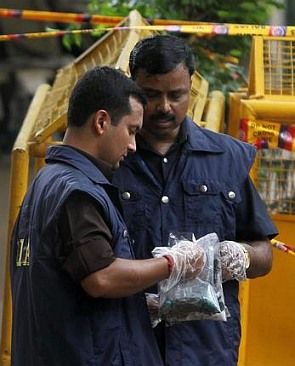'The NIA should be the first to investigate a case of terror and not take over the reins of the state police. We are always re-investigating a case.'
The National Investigation Agency is set for a major revamp, both in terms of power and performance. Vicky Nanjappa/Rediff.com reports.
 The National Investigation Agency, created by the United Progressive Alliance government in the aftermath of the November 26, 2008 terror attacks in Mumbai, has always been viewed with suspicion in the states, and speculation was rife about how the Narendra Modi-led administration would handle it.
The National Investigation Agency, created by the United Progressive Alliance government in the aftermath of the November 26, 2008 terror attacks in Mumbai, has always been viewed with suspicion in the states, and speculation was rife about how the Narendra Modi-led administration would handle it.
The new government, sources close to Prime Minister-designate Modi told Rediff.com, will revamp the NIA and define its role better.
The NIA, which was set up as the premier agency to investigate acts of terrorism, has played second fiddle to police forces in the state. The problem worsened for the NIA when it had to deal with cases in states which did not have the same government as at the Centre.
The agency had to wait for the state government to decide if it wanted the NIA to probe a case or not. Often, state governments quoted the Constitution (which says that law and order is a state subject) to keep the NIA at bay.
An NIA agent told Rediff.com that the biggest change the agency expects is a sense of coordination with police forces in the states.
"We wait at a blast site for three days. After the state police realises it cannot go any further, we are told to take over the case. We want the state police to cordon off the site and protect the evidence," the agent said.
"The NIA should be the first to investigate a case of terror and not take over the reins of the state police. We are always re-investigating a case," the officer pointed out.
"While the previous government had the right intent in setting up the NIA, it failed to define its role correctly and deprived the agency of teeth. While dealing with terror we need to have the power to directly coordinate with a foreign agency to track the terrorists."
Now "we need to intimate the government, which in turn tells R&AW (the Research and Analysis Wing, India's external intelligence agency) to do this job. This causes procedural hurdles. We had proposed this (that the NIA is granted the power to liaise directly with foreign agencies) to the UPA government, but it was not approved."
"We also need an independent cyberagency and intelligence unit," the NIA agent added. "We are not trying to usurp the powers of the Intelligence Bureau or R&AW. We just want to reduce the procedural delays in tracking down terrorists."
The Intelligence Bureau has, however, sounded a note of caution.
While granting the NIA greater powers, the IB feels the Modi government should ensure that the NIA does not become larger than the law.
"While they need an intelligence unit of their own, one must bear in mind that they cannot stop coordinating or keeping the Intelligence units in the loop," an IB official told Rediff.com
"If this coordination can be worked out, then the demand by the NIA is valid."
Image: National Investigation Agency agents collect evidence from a blast site. Photograph: PTI Photo










